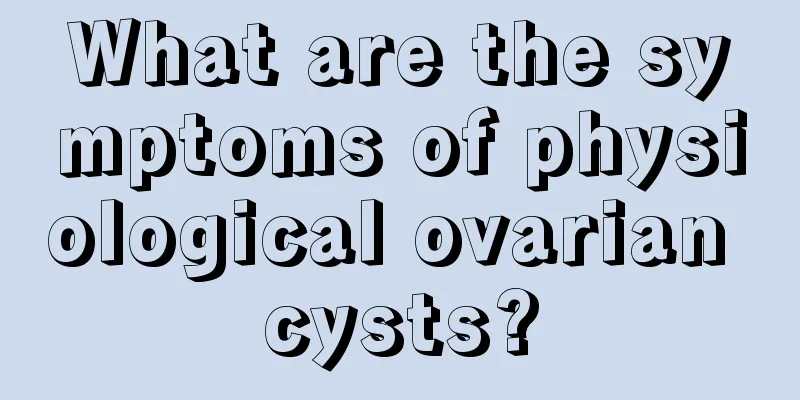What are the symptoms of physiological ovarian cysts?

|
Physiological ovarian cysts are relatively common gynecological diseases. Many female friends do not know much about this disease, nor do they understand what symptoms will accompany it, so the disease cannot be discovered early when it occurs. Generally, physiological ovarian cysts will have more symptoms, such as abdominal pain, menstrual disorders, feeling of pressure, etc. These symptoms will make patients feel uncomfortable. Clinical manifestations 1. Discomfort in the lower abdomen: This is the initial symptom before the patient feels a mass in the lower abdomen. Due to the weight of the tumor itself and the influence of intestinal peristalsis and changes in body position, the tumor moves in the pelvic cavity, involving its pedicle and pelvic infundibulum ligament, causing the patient to have a feeling of distension and heaviness in the lower abdomen or iliac fossa. 2. Increased abdominal circumference and intra-abdominal mass: This is the most common phenomenon. Patients find that their clothes or belts seem tight and then notice the enlargement of their abdomen, or they occasionally feel bloating and discomfort in the morning, so they press their abdomen and find a mass in the abdomen. 3. Abdominal pain: If the tumor has no complications, there will be very little pain. Therefore, if patients with ovarian tumors feel abdominal pain, especially if it occurs suddenly, it is mostly caused by torsion of the cyst pedicle, rupture and bleeding of the tumor, or infection. In addition, malignant cysts often cause abdominal pain and leg pain, often causing patients to seek emergency treatment. 4. Menstrual disorders: Generally, ovarian or even bilateral ovarian cysts do not cause menstrual disorders because they do not destroy all normal ovarian tissues. Some uterine bleeding is not endocrine, because ovarian tumors change the pelvic blood vessel distribution and cause endometrial congestion; or because ovarian malignant tumors directly metastasize to the endometrium. Menstrual disorders caused by endocrine tumors are often combined with other secretory influences. 5. Compression symptoms: Larger cysts will cause compression around the bladder, causing frequent urination and difficulty urinating. Large ovarian tumors can cause dyspnea and palpitations due to compression of the diaphragm. Ovarian tumors combined with large amounts of ascites can also cause these symptoms. 6. Infertility: The ovaries are the place where eggs develop, mature and are discharged. The follicles at different stages are in the ovarian cortex. If the ovaries are damaged by cysts, the development, maturation and discharge of the eggs will be impaired, which will lead to infertility. Ovarian cysts are a type of ovarian tumor, and the mechanism by which they cause infertility is related to interference with ovulation function. |
<<: What are some recipes for menstrual period?
>>: What is the solution for ectopic pregnancy?
Recommend
What is HPV and can it be cured?
HPV is a highly contagious virus that is mainly t...
What are the contraindications of taking Chinese medicine for regulating menstruation?
Nowadays, the pace of social life is accelerating...
Can I test for pregnancy five days after sex?
The time we choose for intercourse is very import...
What complications may occur if you induce labor at four months?
In clinical practice, sometimes some unexpected s...
Menstrual bleeding after wearing the ring
Some women choose to have an abortion due to an u...
This disease is widely hidden in the population, causing great harm, but few people know about it.
The cause of hypochondriasis is still unknown. Hi...
What is the difference between Americano and latte? Can red wine and coffee be drunk together?
Coffee is a perennial evergreen shrub or small tr...
Optim.al: From April 2009 to December 2011, Facebook added an average of 600,000 new users per day, 7 new users per second
According to data from Optim.al, Facebook's a...
What to eat to stop breastfeeding?
Many mothers easily find that their milk supply i...
What is the normal value of progesterone in early pregnancy?
We know that the progesterone level is very impor...
A 13-year-old girl has been suffering from cervical cancer for 7 years! How can she get cervical cancer at such a young age?
Cervical cancer is a common malignancy that can o...
2 months pregnant
Two months of pregnancy is in the early stages of...
Uterine fibroids 6cm pregnancy
Uterine fibroids are a common type of tumor among...
Protecting the pancreas is protecting the lifeline! Start with these 5 small things!
Pancreatic cancer, which has attracted much atten...
Can I take a medical examination during my menstrual period?
Competition in today's society is very fierce...









